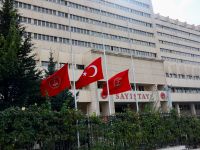Iraq threatened anew Thursday to halt its UN-authorised oil exports and put the squeeze on the already tight world oil market unless the UN sanctions committee lifted its curbs on Baghdad's import contracts.
"We, the Iraqi people, are thinking seriously that ... we should stop exporting oil, at least until the 661 (sanctions) committee releases the 'on-hold' Iraq contracts so that we can benefit from our exported oil," said the Baghdad Observer.
The official daily, in an editorial, was referring to the UN oil-for-food programme under which Iraq is authorized to export crude under strict UN supervision to finance imports of essential goods.
The programme, launched in December 1996, is run in six-monthly phases, the latest of which expires on December 5. Iraq has been under sanctions since its 1990 invasion of Kuwait.
"If the world community doesn't feel its responsibility towards Iraq's suffering, why should Iraq feel responsible for the expected oil price increase in case it stopped exporting?" asked the Baghdad Observer.
"Why should Iraq continue exporting its oil while the revenues are being directed away from its people? Are we exporting oil to pay compensations and UN salaries?" it asked.
A third of the revenues from the oil exports are deducted to pay compensation for the 1991 Gulf War which evicted Iraqi occupation forces from Kuwait and to finance UN operations in Iraq.
In London, the price of oil paused just above 33 dollars a barrel on Thursday despite Iraq's latest threat, as a quiet market digested signs that stocks of crude were increasing in the United States.
The market remained skeptical that Baghdad would carry out its threat. "There have been so many threats and problems that people are not going to take any action until they actually see a definitive declaration that Iraq is doing it," GNI analyst Lawrence Eagles said.
The Observer charged that the UN programme, which Baghdad accepted reluctantly but only as a temporary measure while pressing for a total lifting of sanctions, had turned into "a permanent UN measure crippling Iraq and harming its people."
Last week, Iraq exported 17.2 million barrels under the programme, an average of 2.46 million bpd, which experts said was close to capacity due to the rundown state of its oil industry, the United Nations said in its latest update.
Playing down Iraq's previous threats to brandish the oil weapon, US Energy Secretary Bill Richardson said in Riyadh on Sunday that Gulf states would make up any potential shortfall in world supplies.
Baghdad last week informed customers they had to pay a premium of 50 cents over the barrel into an account outside the control of the United Nations and warned that contracts would be scrapped if they failed to comply.
Fears of non-compliance have raised the possibility of Iraqi crude being priced out of the market leading to a halt in exports from early December. The premium would also amount to a violation of the sanctions regime.
The value of Iraqi import contracts currently blocked by the sanctions committee amounts to $2.3 billion, including $325 million for oil industry spare parts, according to the United Nations.
"The committee members often cite the lack of technical specifications and potential dual (civilian-military) use as reasons for placing a contract on hold," the UN Office of the Iraq Programme said Tuesday. The sanction regime is linked to Iraq's disarmament.—AFP.
©--Agence France Presse.
© 2000 Mena Report (www.menareport.com)








